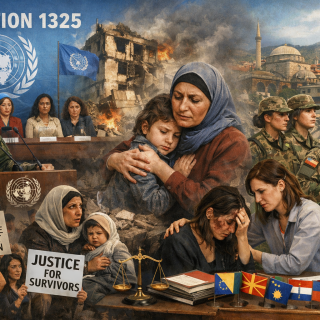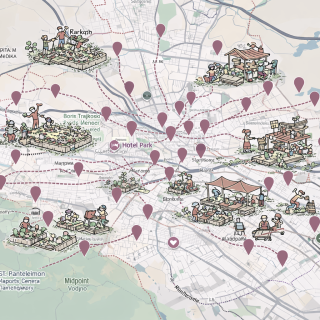Transitional justice remains one of the most fragile issues for the Western Balkans societies, considering the fact that at no given moment has the political leadership responded to the democratic need of implementing such a process. It is not by chance that transitional justice in our countries has been considered a “witch hunting” mechanism or a process dependant on the interests stemming from international interventions; keeping the skeletons of the past well away from the public opinion, inside the drawers of hybrid and transitory regimes. Compared to other countries in the region, Albania is one of the least researched countries in terms of its communist past, by relegating transitional justice as a field specifically addressing in the region countries in conflict or that face state-forming processes. Therefore, my PhD project focuses on making a comparison between three countries: Albania, Kosovo, and North Macedonia, with the purpose of identifying the differences and dimensions that transitional justice may have as a basket of mechanisms within states of different forming features; how the societies of this region – after the dissolution of the Yugoslav Federation and the fall of communism – view their past differently, and determine transitional justice differently. These differences within the same field of study have provided me with a quality basis to understand how our societies – albeit through an unwavering European perspective – seek to establish the rule of law, having the common challenge of collective memory to make a clear difference that communism has left behind its legacy and that democracy should be here to transform the power of such heritage into the power of accountability and rule of law.
This PhD thesis elaborates the key pillars and concepts of transitional justice in these countries by establishing a common basis of understanding the perception of justice: the areas of its implementation as a state-forming instrument and the opposing elements that stem from a qualitative analysis of data from high-level interviews conducted in the three countries object of the study.
The thesis focuses mainly on a theoretical evolution of transitional justice as an international norm, and its development towards transformative efforts in achieving justice goals. This thesis aims to explain the paradigm of transition in a specific way among highly divided societies and the post-communist countries that the three case studies cover. Considering that there are few studies and studies available on this topic, few researchers have dealt with the issue of justice and reconciliation in the Western Balkan countries, therefore, it is essential to present at a multi-disciplinary level the paradigm of transitional justice and the relationship between the truth and justice/democracy towards the dilemmas in the regional context.
Post-communist and post-totalitarian Albania is an interesting case study in the framework of Transitional Justice (TJ) modelling due to the overwhelming ‘amnesia’ from the beginning of the regime change in the 1990s. Forgetting and covering what happened during the totalitarian dictatorship in 1944-1990 under the communist dictator Enver Hoxha has left behind to this day its political shadows. The absent implementation of TJ measures may also relate to the fact that Albania has a high level of political corruption and poor results in international rankings.
Measures concerning the Rule of Law and Transitional Justice (TJ) are not replicable formulas that each society must follow to achieve a certain level of development. The timeline of political events and decisions made in the 32 years of transition in Albania reflect the approach that every measure corresponds to anyone in the establishment of the institutions in which transitional justice may contribute towards increasing transparency, accountability, and consequently, the rule of law.
Despite a series of legal and constitutional reforms, as well as efforts to initiate measures of transitional justice, Albania has poor results in the rule of law and democratic performance. For the sake of the European integration and the compliance with the OSCE standards, the country seeks to accomplish the requirements made by other international actors. Such compliance does not make Albania different from other post-communist countries in the region; yet, Albania is different and unique in terms of discussing the implementation of any transitional justice mechanism for which there is still visible hesitation. The continuous political propaganda about the rule of law does not compensate the absence of political responsibility and willingness to deal with the massive violations of human rights in the past.
Efforts to draft a program in the context of transitional justice have been undermined and its scope is limited due to the lack of interest from the civil society to advance the discourse of transitional justice in the political agenda, and due to the lack of a national strategy on how the nation can reconcile with its communist past.
Justice is a political concept and requires willingness, national conscientiousness and acknowledgment of the truth to be placed on top of the political agendas. If given priority, justice may undoubtedly contribute to and guide the development of a society and the democratization of a certain country. This becomes particularly important for post-communist and post-conflict countries like Albania, North Macedonia, and Kosovo, where the healing of the wounds of the society require a strong will to achieve the much-needed justice, while at the same time keep social cohesion and co-existence strong and unimpaired. Transitional justice is a key approach to address these challenges in the societies and countries going through rapid changes, like Albania, North Macedonia, and Kosovo.
Ines Stasa was born and raised in Albania, where she finished bachelor’s in political science at the University of Tirana. Ines is graduated with a M.A in International Relations at Leeds Beckett University in United Kingdom. Currently, she is finishing her Ph.D. thesis on transitional justice in a comparative analysis between Albania, Kosovo, and North Macedonia. Her thesis is a combination of qualitative and quantitative methods in two main theories of compliance and of regime change and consolidation in the Western Balkan countries. She has presented research articles in many international conferences and published in international journals mainly on transitional justice, responsibility to protect, liberal international order and of politics on gender justice. Ines has also participated at OSCE/ODIHR school on Political Parties and Democracy; also attended the summer school “Democratic innovations in the EU and in Europe”, held by University of Saint –Louis Brussels; Summer School participant “Justice after mass atrocities” organized by Center for Comparative Conflict Studies, University of Belgrade, and participant at Summer School “EU law and European Governance in populist times”, UClan Cyprus, School of Law. Recently she held an intensive training program of Leadership Academy for Development led by Prof.Francis Fukuyama and faculty members at Stanford University. Ines research interests are on democratization processes in the Western Balkans, reconciliation, and transitional justice.




